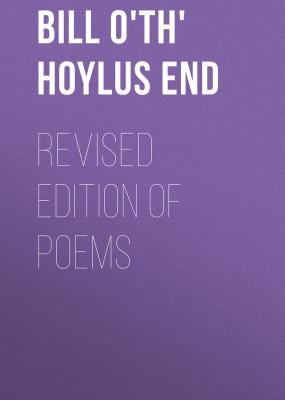Revised Edition of Poems. Bill o'th' Hoylus End
Читать онлайн.| Название | Revised Edition of Poems |
|---|---|
| Автор произведения | Bill o'th' Hoylus End |
| Жанр | Зарубежные стихи |
| Серия | |
| Издательство | Зарубежные стихи |
| Год выпуска | 0 |
| isbn | http://www.gutenberg.org/ebooks/27781 |
Aw’d give a crahn, if aw’d to sub,
To get her name.
I’ this wide world aw’m set afloat,
Th’ poor regg’d possessor of one coat;
Yet linen clean, aw on tha dote,
An’ thus assert,
Tha’rt worthy o’ great Shakespeare’s note —
A clean lin’ shirt.
Low is mi lot, an’ hard mi ways,
While paddlin’ thro’ life’s stormy days;
Yet aw will sing t’owd lass’s praise,
Wi’ famous glee;
Tho’ rude an’ rough sud be mi lays,
Shoo’s t’lass for me.
Bards hev sung the fairest fair,
Their rosy cheeks an’ auburn hair;
The dying lover’s deep despair,
Their harps hev rung;
But useful wimmin’s songs are rare,
An’ seldom sung.
In a Pleasant Little Valley
In a pleasant little valley near the ancient town of Ayr,
Where the laddies they are honest, and the lassies they are fair;
Where Doon in all her splendour ripples sweetly through the wood,
And on its banks not long ago a little cottage stood;
’Twas there, in all her splendour, on a January morn,
Appeared old Coila’s genius – when Robert Burns was born.
Her mantle large of greenish hue and robe of tartan shone,
And round its mystic border seen was Luger, Ayr, and Doon;
A leaf-clad holly bough was twined so graceful round her brow,
She was the darling native muse of Scotia then, as now:
So grand old Coila’s genius on this January morn,
Appeared in all her splendour when Robert Burns was born.
She vowed she ne’er would leave him till he sung old Scotia’s plains —
The daisy, and the milk-white thorn he tuned in lovely strains;
And sung of yellow autumn, or some lovely banks and braes:
And make each cottage home resound with his sweet tuneful lays,
And sing how Coila’s genius, on a January morn,
Appeared in all her splendour when Robert Burns was born.
She could not teach him painting like her Cunningham at home,
Nor could she teach him sculpturing like Angelo of Rome;
But she taught him how to wander her lovely hills among,
And sing her bonny burns and glens in simple rustic song;
This old Coila’s genius did that January morn,
Vow in all her splendour when Robert Burns was born.
And in the nights of winter, when stormy winds do roar,
And the fierce dashing waves are heard on Ayr’s old craggy shore,
The young and old encircled around the cheerful fire,
Will talk of Rob the Ploughman and tune the Scottish lyre;
And sing how Coila’s genius on a January morn,
Appeared in all her splendour when Robert Burns was born.
John o’f’ Bog an’ Keighley Feffy Goast:
A TALE O’ POVERTY
“Some books are lies fra end to end,
And some great lies were never penn’d;
But this that I am gaun to tell,
* * * Lately on a night befel.” – Burns.
’Twor twelve o’clock wun winter’s neet,
Net far fra Kersmas time,
When I met wee this Feffy Goast,
The subject of mi rhyme.
I’d been hard up fer monny a week,
Mi way I cuddant see,
Fer trade an’ commerce wor as bad
As ivver they could be.
T’poor hand-loom chaps wor running wild,
An’ t’combers wor quite sick,
Fer weeks they nivver pool’d a slip,
Ner t’weivers wave a pick.
An’ I belong’d ta t’latter lot,
An’ them wor t’war o’t’ two,
Fer I’d nine pair o’ jaws i’ t’haase,
An nowt for ’em ta do.
T’owd wife at t’ time wor sick i’ bed,
An’ I’d a shockin’ cowd,
Wal t’youngest barn we hed at home,
Wor nobbut three days owd.
Distracted to mi varry heart,
At sitch a bitter cup,
An’ lippenin’ ivvery day at com,
At summat wod turn up;
At last I started off wun neet,
To see what I could mak;
Determin’d I’d hev summat ta eit,
Or else I’d noan go back.
Through t’Skantraps an’ be t’ Bracken Benk,
I tuke wi’ all mi meet;
Be t’ Wire Mill an’ Ingrow Loin,
Reight into t’ oppen street.
Saint John’s Church spire then I saw,
An’ I wor rare an’ fain,
Fer near it stood t’owd parsonage —
I cuddant be mistain.
So up I went ta t’ Wicket Gate,
Though sad I am ta say it,
Resolv’d to ax ’em for some breead,
Or else some brocken meit.
Bud just as I wor shackin’ it,
A form raase up before,
An’ sed “What does ta want, tha knave,
Shackin’ t’ Wicket Door?”
He gav me then ta understand,
If I hedant come to pray,
At t’grace o’ God an’ t’breead o’ life,
Wor all they gav away.
It’s fearful nice fer folk ta talk
Abaat ther breead o’ life,
An’ specially when they’ve plenty,
Fer t’childer an’
